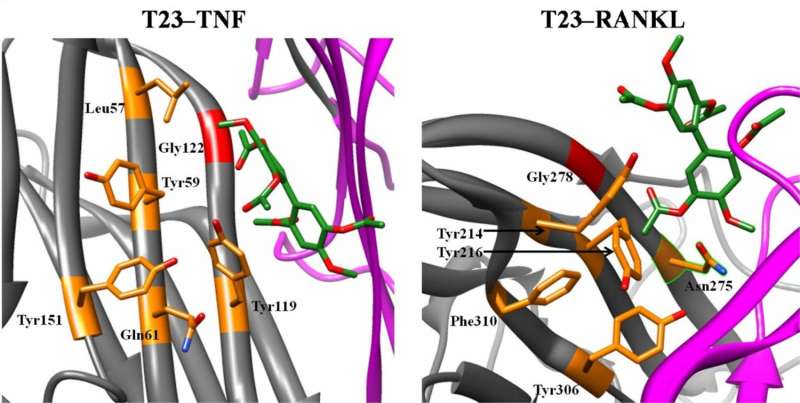Scientists ID two molecules that inhibit proteins involved in chronic inflammatory disease

Scientists have identified two small molecules that could be pursued as potential treatments for chronic inflammatory diseases. According to a paper published in PLOS Computational Biology, the researchers singled out the molecules using a new drug screening approach they developed.
Both molecules, known as T23 and T8, inhibit the function of a protein called tumor necrosis factor (TNF), which is involved in inflammation in diseases such as rheumatoid arthritis, Crohn's disease, psoriasis, multiple sclerosis, and more. Drugs that inhibit TNF's function are considered the most effective way to combat such diseases. However, not all patients respond to them, and their effectiveness can wear off over time.
To aid discovery of better TNF inhibitor drugs, Georgia Melagraki and colleagues from Greece and Cyprus developed a new computer-based drug screening platform. The platform incorporates proprietary molecular properties shared between TNF and another protein called RANKL, which is also involved in chronic inflammatory diseases.
The researchers developed the platform based on a combination of advanced computational tools. The platform was then used to virtually screen nearly 15,000 small molecules with unknown activity and to predict their interactions with the TNF and RANKL proteins; specifically, how well the small molecules might disrupt the protein-protein interactions (PPIs) leading to the trimerization and activation of these crucial proteins. "This virtual experiment identified nine promising molecules out of thousands of candidates," says study co-corresponding author Antreas Afantitis of NovaMechanics Ltd, Cyprus.
To further evaluate their potential, the scientists studied how the nine small molecules interacted with TNF and RANKL in real-world laboratory experiments. Of the nine molecules, T23 and T8 surfaced as particularly strong TNF inhibitors. Both molecules bind to TNF and RANKL, preventing them from interacting properly with other proteins. Both also show low potential for causing toxic side effects in humans.
With further research, T23 and T8 could be "further optimized to develop improved treatments for a range of inflammatory, autoimmune, and bone loss diseases," says study co-corresponding author George Kollias of the Biomedical Sciences Research Center 'Alexander Fleming', Greece. Meanwhile, the new virtual drug screening approach could enable discovery of other promising TNF inhibitors, and could be modified to search for potential treatments for additional diseases.
More information: Melagraki G, Ntougkos E, Rinotas V, Papaneophytou C, Leonis G, Mavromoustakos T, et al. (2017) Cheminformatics-aided discovery of small-molecule Protein-Protein Interaction (PPI) dual inhibitors of Tumor Necrosis Factor (TNF) and Receptor Activator of NF-κB Ligand (RANKL). PLoS Comput Biol 13(4): e1005372. doi.org/10.1371/journal.pcbi.1005372

















